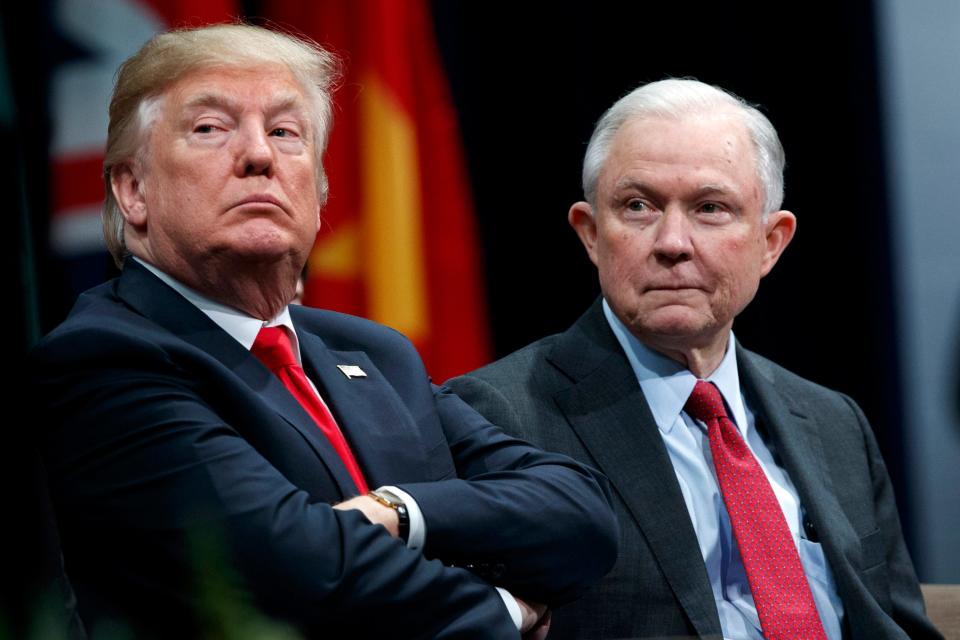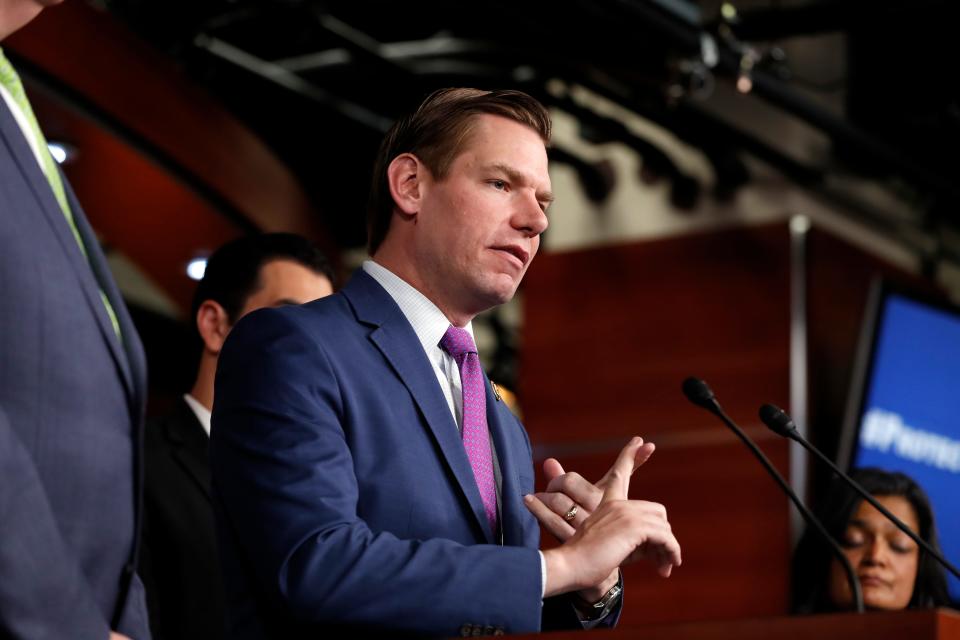DOJ inspector general to review Trump Justice Department's seizure of Democrats' phone data
WASHINGTON – The Justice Department’s independent watchdog on Friday announced that it was launching a broad investigation into whether the Trump administration and its two attorneys general improperly seized phone records of House Democratic lawmakers, their staff and journalists as part of an aggressive 2018 leak investigation.
Justice Department Inspector General Michael Horowitz confirmed that he would launch an investigation into it, as well as on the use of subpoenas to obtain journalists' phone records. Horowitz also said his watchdog agency would look beyond subpoenas to “other legal authorities (used) to obtain communication records … in connection with recent investigations of alleged unauthorized disclosures of information to the media by government officials.”
“The review will examine the Department’s compliance with applicable DOJ policies and procedures,” Horowitz said, “and whether any such uses, or the investigations, were based upon improper considerations. If circumstances warrant, the OIG will consider other issues that may arise during the review.”
The Office of Inspector General can initiate investigations based on information received from a variety of sources, including its own hotline, referrals from agencies or Congress. In this case, Deputy Attorney General Lisa Monaco made the request.
The announcement came after Democratic Reps. Adam Schiff and Eric Swalwell confirmed that Trump-era Justice Department officials secretly seized their Apple phone data as well as that of 10 or so other House Intelligence Committee members and their relatives.
The subpoena, which Apple received in early 2018, appeared to have cast a wide net, seeking data on more than 100 phone numbers and email addresses, according to the company. It also included a gag order that, for three years, prevented Apple from telling lawmakers their data had been seized.
Senate Democratic leaders demanded on Friday that then-President Donald Trump’s two attorneys general, William Barr and Jeff Sessions, testify about the seizure of phone records.

The New York Times, which first reported on the seizure Thursday night, said the Justice Department subpoenaed Apple for phone data of Democratic lawmakers and their aides and family members, one of whom is a minor, to find out sources of media reports about contacts between Trump associates and Russia.
A Justice Department spokesman declined to comment. Barr also declined to comment.
In an interview with Politico, Barr said he didn't recall getting briefed on the matter. But Barr, according to The Times, revived the leak investigations even after they had found no evidence against the lawmakers.
Data sought on dozens of numbers, emails
In a statement Friday, Apple said it received a federal grand jury subpoena on Feb. 6, 2018 seeking "customer or subscriber account information" tied to 73 phone numbers and 36 email addresses.
This doesn't necessarily mean the subpoena sought the phone and email data of 109 different people because some of the numbers and addresses are tied to one Apple subscriber, while others aren't tied to any subscribers, according to the company.
The subpoena did not state the nature of the investigation, Apple said, adding that the company provided only metadata and account subscriber information, not emails or pictures.
Apple said the gag order was extended three times. The Justice Department under the Biden administration did not seek to extend the gag order, allowing Apple to inform the subjects of the subpoena on May 5 that their phone metadata and account subscriber information had been seized.
Demanding answers
A House intelligence committee official confirmed the existence of the subpoenas in an interview with USA TODAY on Friday and described them as a politically motivated effort to retaliate “against people who were rightly investigating the Trump administration for abuses.”
“A question that we have for the Department of Justice is what legally was this predicated on? When did it start? And how did it continue?” said the committee official, who also spoke on the condition of anonymity because they were not authorized to discuss the matter publicly.
“We have repeatedly posed basic and readily answerable questions to the Department for more than a month but have received virtually no information beyond a confirmation that the investigation is closed,” the committee official said. “The Department's refusal to provide information is unacceptable, and they will need to provide a full accounting of this and other instances in which law enforcement was weaponized against Donald Trump's political opponents.”
On Thursday night, after The Times published its report, Swalwell went on CNN and confirmed that his phone data was among those that were seized, as well as data from other lawmakers and their family members.
"I believe (the family members) were targeted punitively, not for any reason in law, (but) because Donald Trump identified Chairman Schiff and members of the committee as an enemy of his," Swalwell told CNN, adding that the gag order was motivated by fear of a public perception that the Trump administration was targeting perceived political enemies.

'Harrowing' targeting of political opponents, Democrats say
House Democrats promptly denounced the data seizure and called for an inspector general investigation.
"The news about the politicization of the Trump administration Justice Department is harrowing," House Speaker Nancy Pelosi, D-Calif., said in a statement. "These actions appear to be yet another egregious assault on our democracy waged by the former president."
Democrats have also long said that Trump used the Justice Department to go after his perceived political enemies, an allegation that Schiff repeated Thursday night.
"It's clear his demands didn't fall on deaf ears. This baseless investigation, while now closed, is yet another example of Trump's corrupt weaponization of justice," Schiff, D-Calif., said.
In an interview with CNN, Schiff said several more lawmakers or staffers' phone data may have been targeted as part of the leak investigation. He said people who received notices from Apple initially thought the emails were either spam or phishing attempts.
Journalists targeted, too
The Justice Department during the Trump administration also secretly obtained the phone records of journalists from The New York Times, The Washington Post and CNN. Trump and his former aides have publicly condemned leaks to the press that often led to unflattering news about the White House.
Faced with criticism from journalists and media advocates, the Biden administration announced it would no longer secretly obtain reporters' records during leak investigations, a departure from a policy used by previous administrations to try to identify sources who provided journalists with classified information.
This article originally appeared on USA TODAY: Trump DOJ secretly seized phone data; inspector general will review

 Yahoo Movies
Yahoo Movies 
